Diplomatic Events
- Details
- Written by Silvia
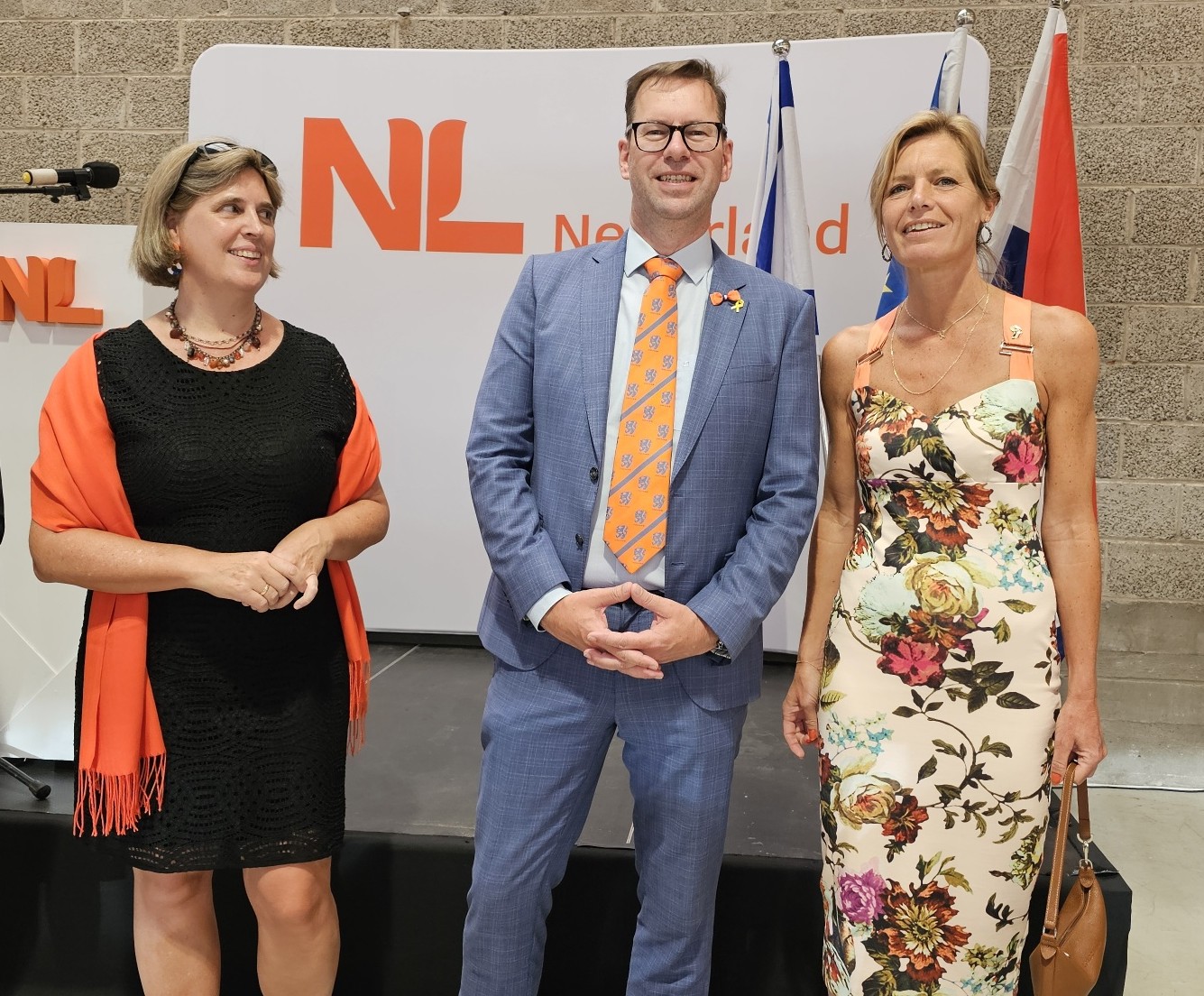
The King’s Day Event 2025 celebration organized by the Embassy of the Kingdom of the Netherlands in Israel was held on Tuesday, 13 May, at Design Terminal Bat Yam (Ehud Kinamon St. 32, Bat Yam).
King's Day is a national holiday in the Netherlands. It is a day to celebrate the birthday of the King of the Netherlands. Traditionally this day is celebrated with music and dance, celebrations and festivals, and donning of festive attire, particularly in orange, the national color of the Netherlands.
The national anthems of Israel and the Netherlands were sung by cantor Daniel Colthof, and the venue was bedecked in orange to mark the occasion.
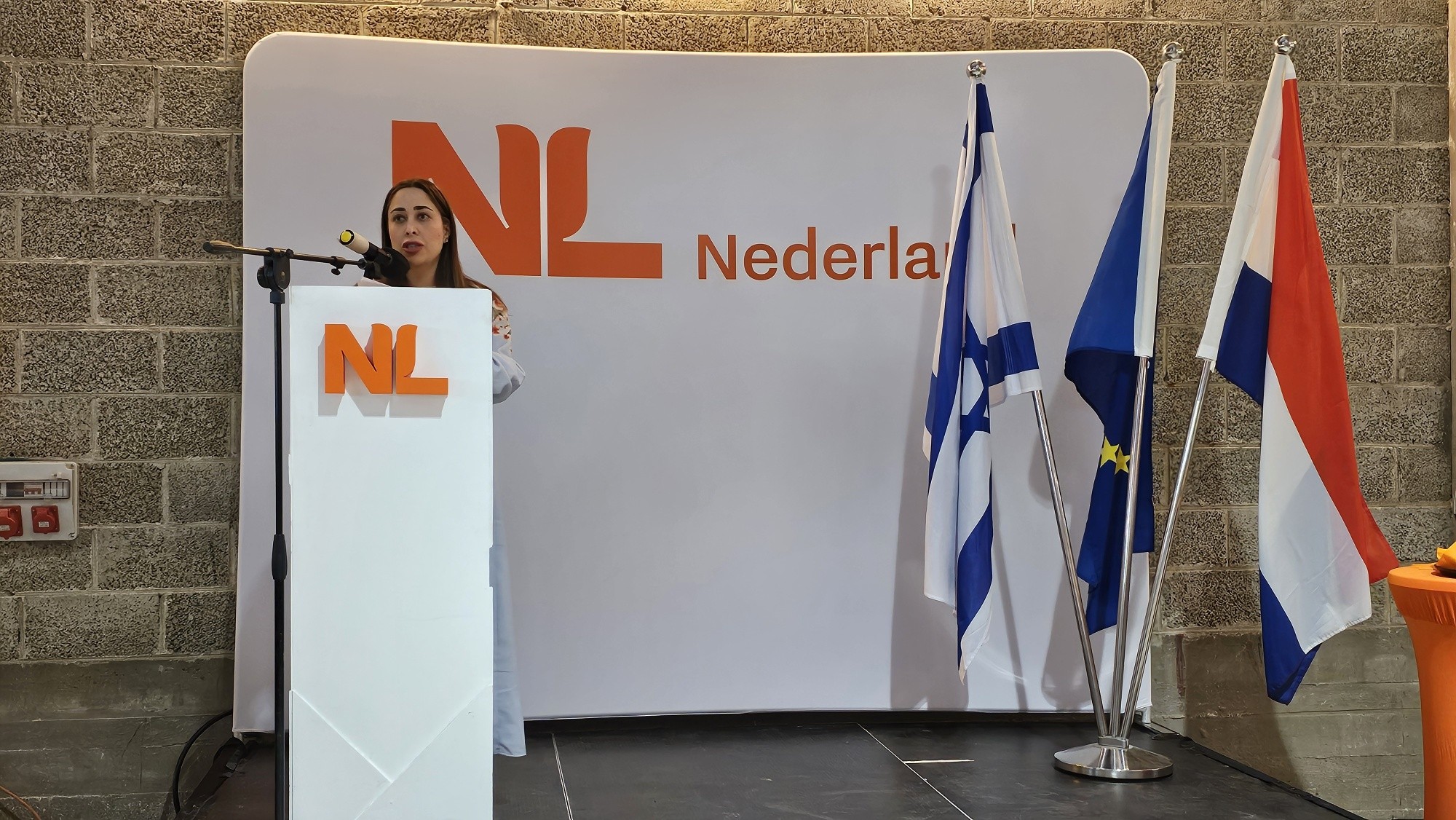
The government of Israel was represented by Minister for Social Equality and Minister for Women’s Empowerment, May Golan.
KLM airlines, the flag carrier airline of the Netherlands, was a sponsor for the evening.
About the venue: Bat Yam Design Terminal is a social design complex in Bat Yam that houses a social gallery, a designer incubator, restoration workshops, and a complex for community events."
More pics at Facebook: Israel Diplo / Diplomacy Israel / Silvia G.Golan
- Details
- Written by Silvia Golan
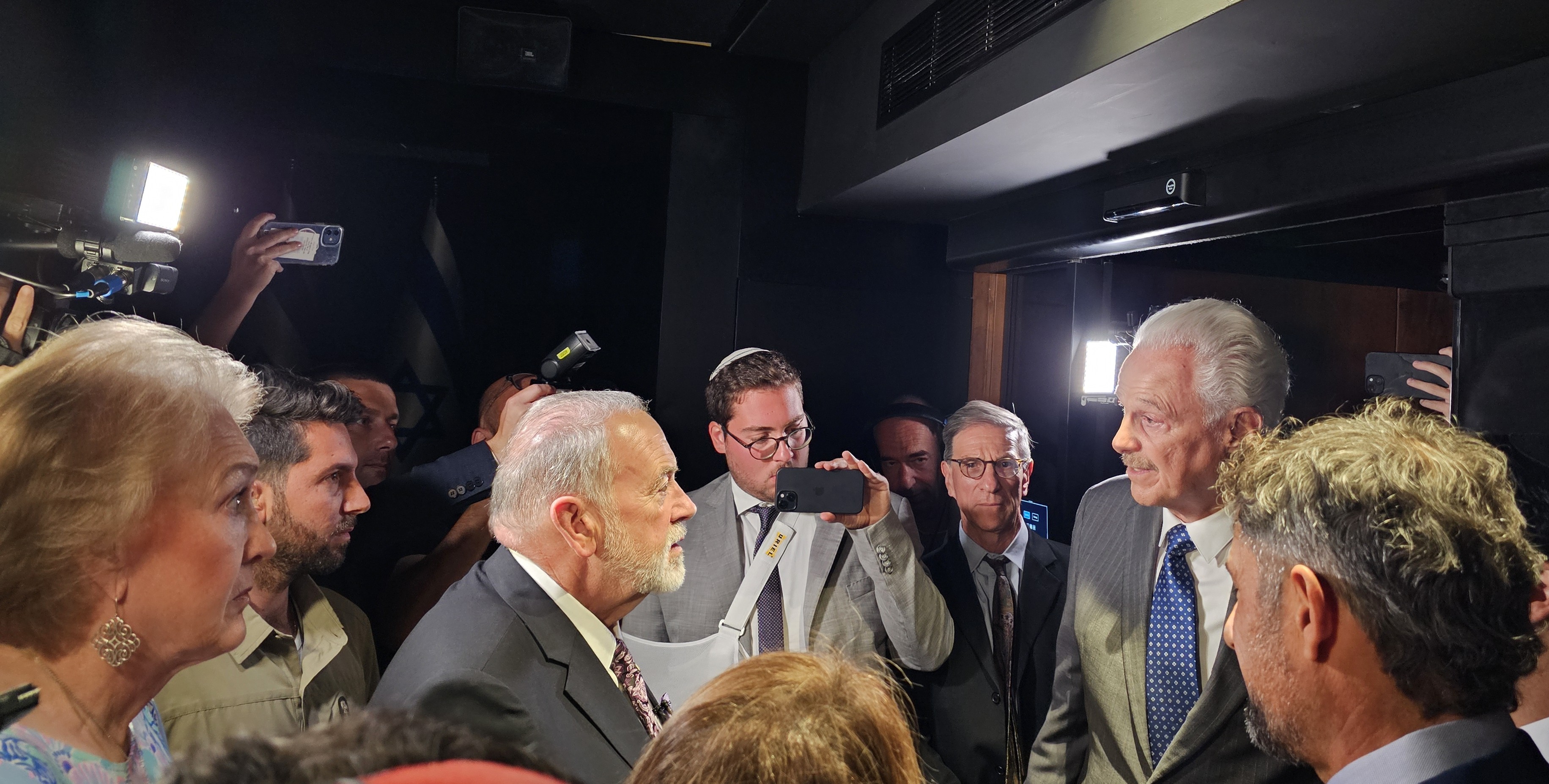
.Today, October 6, 2024 , a Quarter of a Billion Friends of Zion Welcome the incoming U.S. Ambassador to Israel, H.E. Mr. Mike Huckabee
The largest welcoming event in Israel's history, was broadcast tonight globally from the media center of the Friends of Zion Heritage Center in Jerusalem
The official welcome ceremony for the incoming U.S. Ambassador to Israel, Mike Huckabee, was held last night (Tuesday) at the Media Center of the Friends of Zion (FOZ) Museum in Jerusalem. The event was initiated and hosted by Dr. Mike Evans, founder of the friends of Zion museum, a close advisor to President Donald Trump, and one of the most influential figures in the global Evangelical community.
The event was attended by hundreds of guests from Israel and abroad, Ambassadors, ministers, members of parliament, associates of President Trump and very significant legislators in Washington DC such as the speaker of the house Mike Johnson senator Ted Cruz and many more. The event was broadcast to hundreds of millions of viewers worldwide. Key speakers included Dr. Evans, Ambassador Huckabee, Omer Shem Tov – who was held hostage in Gaza for 505 days, and and Ilan and Meirav Gilboa Dalal, the parents of Guy Gilboa Dalal, who was kidnapped from the Nova festival and is still being held captive by Hamas.
U.S. Ambassador Mike Huckabee said at the event: I came here and thought I was in Disney world. I’ve never seen something like this, telling the story of the foz.
No honour better than being called a friend of the Jewish people.
Without the Jewish people I don’t have a faith. The belief, that in the beginning god created the heaven and the earth. And god decided to bring his light and law into the world through the Jewish people. I respect what god chooses to do so and I honour that.
I tell my Jewish friends- I owe you. Without you, my faith doesn’t exist.
A hatred toward antisemitism is a hatred towards god.
Omer, I was taken away by your smile. After all the things you’ve been through, you are able to smile. God is in you. You are stronger than The hate that was surrounded you for 505 days.
We pray for every hostage. I pray for Guy to come back home.Yesterday my wife took her cane and hiked up the snake path in Masada. I’m proud of the hike. Her motivation was that she took pictures and biographies of the hostages with her and prayed for them. The reason she managed to get to the top is because she prayed for each one.
Normally we come to Israel for several weeks and go home. This time we are home."
Dr. Mike Evans, the founder of Friends of Zion and the #1 New York Times bestselling author of 113 books, as well as a Nobel Peace Prize nominee said:" Mike Huckabee, we as Evangelicals are so extremely happy that one of ours, an Evangelical, is now the Ambassador of Israel... And it's a first. The astonishing thing about it is it's an Evangelical with a Biblical worldview being an Ambassador in the Bible land. How novel.
Omer Shem Tov, who was kidnapped on October 7 and released after 505 days in captivity, shared: "I was 505 days at Gaza in captivity. when I was there my belief in god came so strong, everyday I woke up and thanked god that I have air In my lungs, little food on my plate and that my family is safe in israel. I did kiddush every Friday night. My faith and believe in god kept me going".
"Thank you ambassador Huckabee and thank you president Trump. I am here today, standing near Mike Evans because of you. And today, I am the tha happiest man alive". "we have to bring My brothers and sisters home as soon as possible. I believe and I know you can bring them home. So please do everything you can".
Shelly Shem tov, Omer's mother said: "for us it’s a miracle. Omer was born again in Feb 22. Every time I’m trying to tell people how we felt when Omer was in captivity i say there is one thing that parents cannot forget- when their child got lost. There are five minutes that you panic and you don’t know what to do with yourself. For the parents of the hostages , it is more than 1 million minutes, that their children are in hell. hell!!! . And you, ambassador Huckabee and president Trump - you have the power to give to all of the families of the hostages, let them feel what we feel. So please do everything you can to bring them back home"
Ilan Dalal:" Guy has been held in Gaza now for 578 days. Im looking at omer, and I’m praying everyday that my son too will come back home. Guy went with his best friends from kindergarten to a music festival. Non of them came back home. Guy is held hostage in Gaza with his best friend evyatar. Every moment could be their last. Time is running out for them. We must bring them home as soon as possible. Ambassador Huckabee - I wish you a great success in your new role.
As a representative of the strongest country of the world you have an important role . You have the power to influence the parties to achieve a release agreement. Please, my son;s life is in your hand. The U.S.A is the greatest country in the world. Thank you for standing by us, may god bless you".
Evangelical leaders representing a quarter of a billion evangelicals around the world participated in the event, including leaders from two of the largest evangelical denominations: the Southern Baptist Convention and the Assemblies of God.
The Friends of Zion Heritage Center is the world's largest social network platform dedicated to the fight against antisemitism and BDS. Its advanced Media Center hosts dozens of events, activities, and press conferences aligned with the FOZ museum's vision. More than 250,000 visitors have already explored the Friends of Zion Museum since its establishment in 2015.
Tel 02-5329401
https://www.facebook.com/fozmuseumIL
https://www.instagram.com/foz.museum/
https://www.youtube.com/c/FriendsofZionMuseumJerusalem
Photos credit Silvia G. Golan
- Details
- Written by Silvia G. Golan
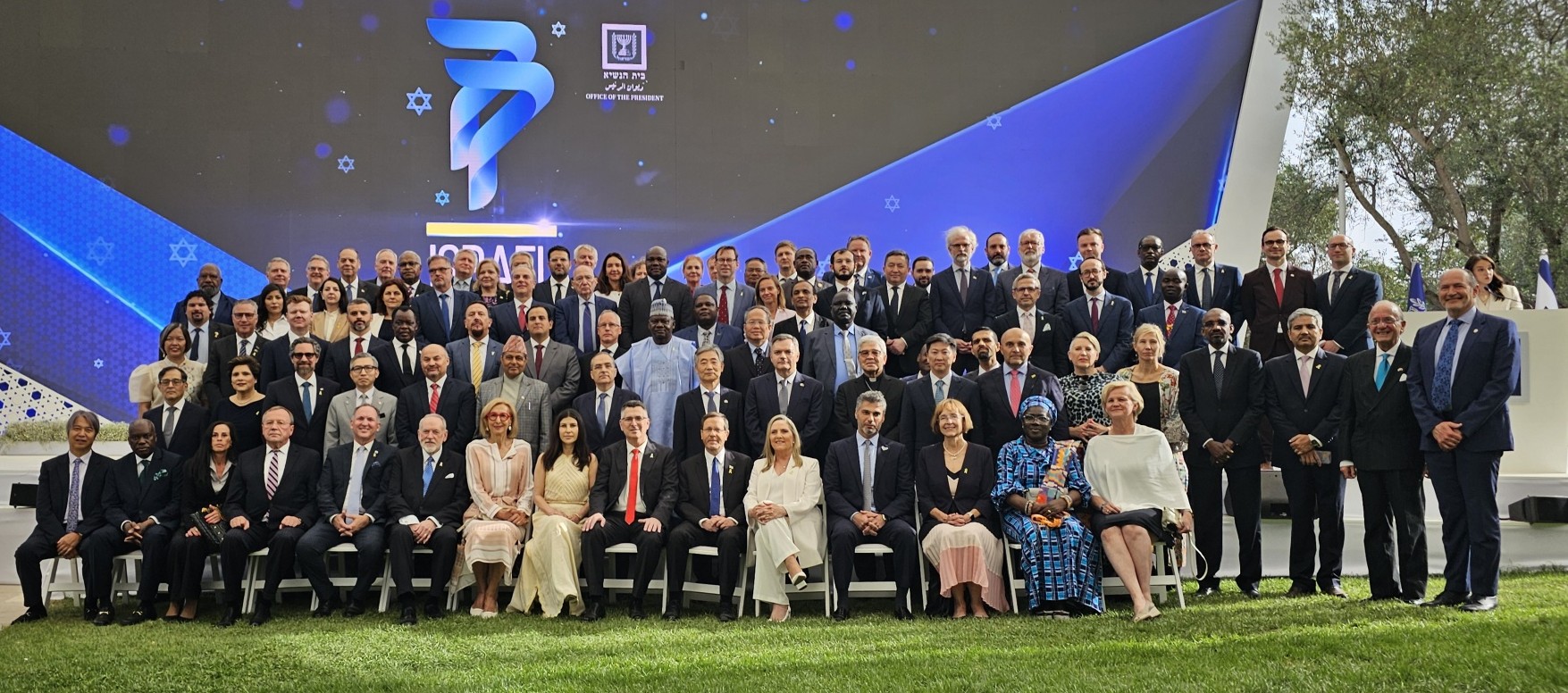
Photo Ambassadors and Representatives of the Diplomatic Corps
Photos credit Silvia G. Golan
More Pics at Facebook Diplomacy Israel / Israel Diplo / Silvia G Golan
- Details
- Written by Silvia G Golan
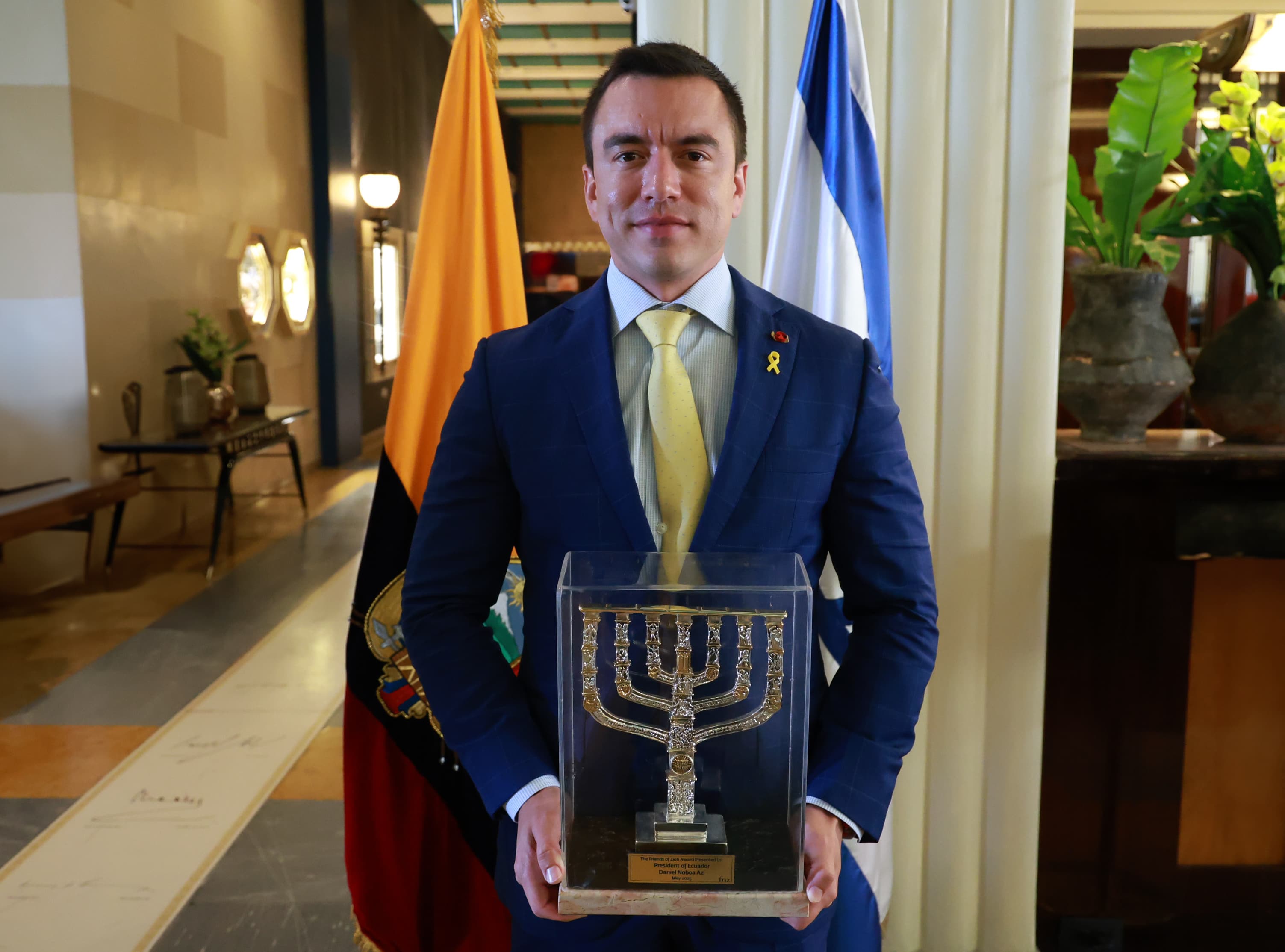
President of Ecuador, H.E. Daniel Noboa Azin diplomatic visit to Israel and received The Friends of Zion Award
President Isaac Herzog held a diplomatic meeting with President Daniel Noboa of Ecuador, making his first visit to Israel, during which he officially opened his country’s new Innovation Research and Development Center in Jerusalem. And meet Prime Minister Benjamin Netanyahu at the Prime Minister's Office in Jerusalem
Israel's Foreign Minister Gideon Sa'ar hosted Ecuador's Foreign Defense and Interior Ministers Mrs.Gabriela Sommerfeld and Mr. John Reimberg in Jerusalem.
The President of the Republic of Ecuador, Mr. Daniel Noboa, as part of his official diplomatic trip to Israel , also visit to the Western Wall Plaza. He was accompanied by a high-level delegation headed by the Ecuadorian Minister of Foreign Affairs and the Ecuadorian Ambassador to Israel. And inaugurated an innovation center in Jerusalem.
President of Ecuador, H.E. Daniel Noboa Azin said : " I am honored and excited to receive the Friends of Zion Award, One of the Most Prestigious Awards ".
President of Ecuador, H.E. Daniel Noboa Azin, received The Friends of Zion Award. The evening at the Friends of Zion Heritage Center in Jerusalem was attended by 300 guests, including ambassadors, distinguished guests, businessmen and other VIP.
The Friends of Zion Heritage Center in Jerusalem hosted the event in honor of the President. The president received the Friends of Zion Award for his steadfast support of Israel these days and in appreciation for 75 years of true relations between Ecuador and Israel.
The Friends of Zion Award was established by the late Shimon Peres, Israel's 9th President and former International Chairman of FOZ. It has been given to over 24 world leaders, including former US President George Bush, former US President Donald Trump, and former Vice President Mike Pence.
President of Ecuador, H.E. Daniel Noboa Azin said: " I would like to express my sincere gratitude to Friends of Zion and Dr. Mike Evans for the meaningful recognition bestowed upon me. This honor is a reflection of the strong ties of friendship between Ecuador and Israel, and it reaffirms our shared commitment to values such as freedom, peace, and cooperation. I am deeply thankful for this gesture, which inspires us to continue working toward a future of mutual respect and solidarity between our nations. "
Dr. Mike Evans, Founder of FOZ stated: “Ecuadorian President Daniel Noboa Azín deserves recognition from Friends of Zion for his firm and determined support for Israel at crucial moments. Since the beginning of his term, he has strengthened diplomatic relations between Ecuador and Israel, upholding principles of solidarity, cooperation, and mutual respect. His leadership has promoted collaborative agreements in key areas such as innovation, security, agriculture, and education, and he has publicly expressed his support for Israel's right to defend itself against, condemning the October 7 attacks and expressing his commitment and support for Israel's security and right to defense. He has also condemned Iran's attacks against Israel. This courageous and consistent stance reflects a deep commitment to the values that Friends of Zion promotes and positions Daniel Noboa Azín as a true friend of the people of Israel”.
The Friends of Zion Heritage Center was established in 2015, in the center of Israel’s capital Jerusalem, by founder Dr. Mike Evans, a number one best-selling author, and a Nobel Peace Prize nominee for a lifetime of combating antisemitism.
The Friends of Zion Heritage center is a Zionist platform dedicated to the fight against anti-Semitism and BDS and concerns itself with bolstering awareness for the historical support of the Christian friends of Israel. Their advanced Media Center holds dozens of events, activities, and press conferences in line with the FOZ museum's vision
Photo credit with President Herzog and Prime Minister Netanyahu: Ma'ayan Toaf (GPO)
Photo credit at FOZ courtesy FOZ Museum
- Details
- Written by President's Spokesperson
President Isaac Herzog today welcomed the new ambassadors to Israel from Cambodia, Fiji, Micronesia, and Nauru.
President Isaac Herzog today, Monday, received the diplomatic credentials of new Ambassadors to Israel from Cambodia, Fiji, Micronesia and Nauru.

Welcoming Ambassador of Fiji, H.E. Mr. Fillipo Tarakinikini, the President noted he looked forward to the planned opening of the country’s new embassy in Jerusalem, and thanked the Ambassador for his country’s important decision.
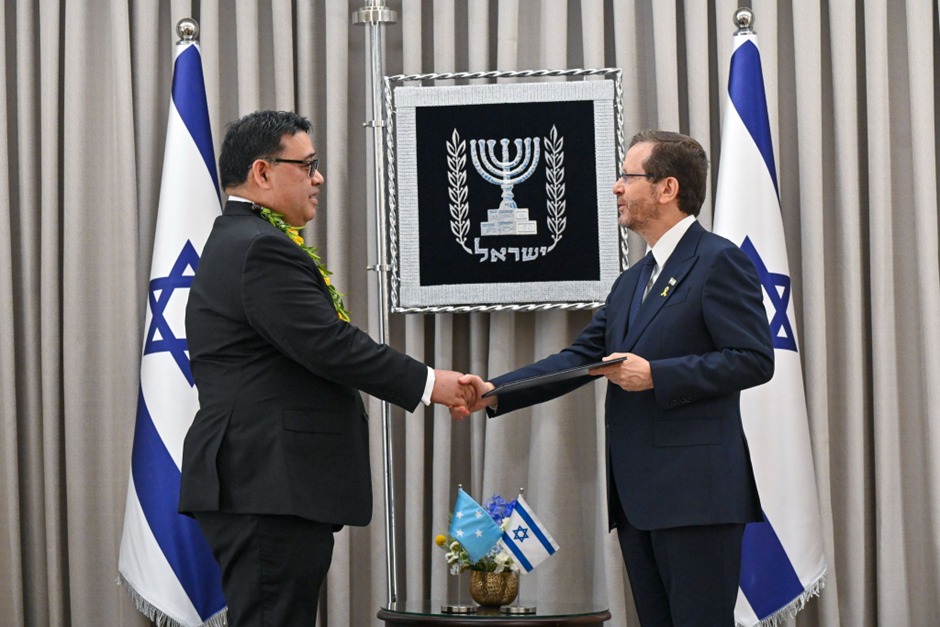
The President thanked newly appointed Ambassador of Micronesia, H.E. Ms. Jackson T. Soram, for the nation’s deep friendship and support for Israel. He noted the longstanding support the country had given to Israel on the international stage, and said he hoped that this important relationship would go from strength to strength.
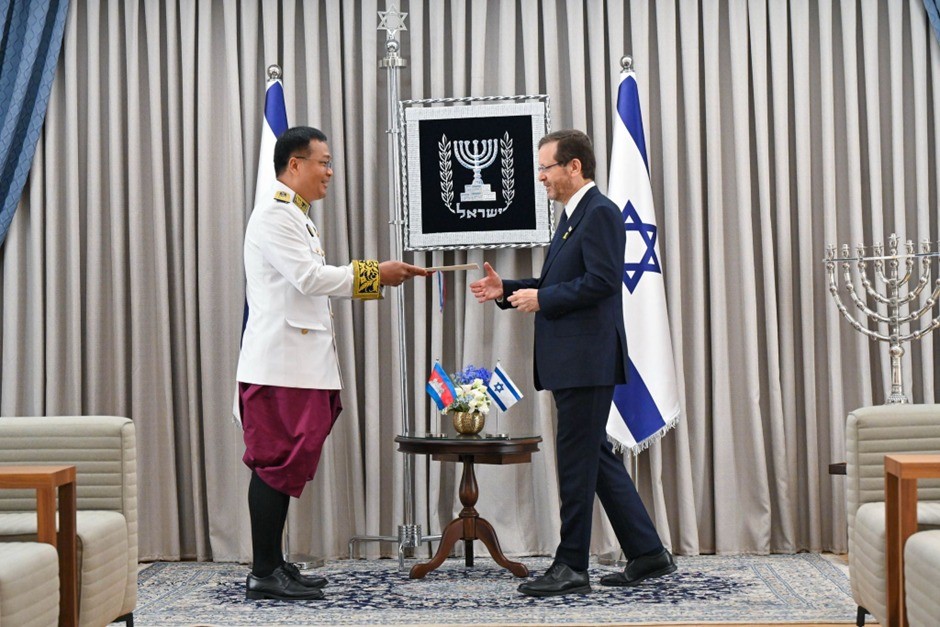
Speaking with Ambassador of Cambodia H.E. Mr. SOK Chea
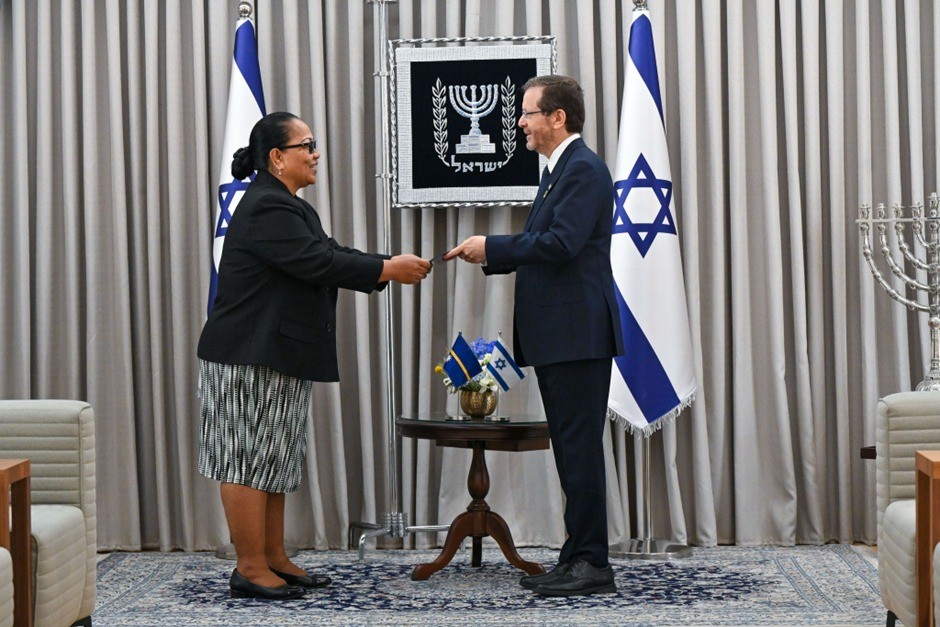
, and Ambassador of Nauru, H.E. Ms. Lara Erab Daniel, the President noted his hope to greatly strengthen with their nations, and noted the great potential for cultural exchanges and cooperation in Agritech between Israel and their countries.
Photo credits: Kobi Gideon (GPO)








